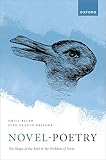Novel-poetry : the shape of the real and the problem of form / Emily Allen, Dino Franco Felluga.
Publisher: Oxford, United Kingdom : Oxford University Press, [2024]Copyright date: ©2024Description: vi, 216 pages : illustrations ; 24 cmContent type:- text
- unmediated
- volume
- 019892920X
- 9780198929208
| Item type | Current library | Status | Barcode | |
|---|---|---|---|---|
 Open Access Books - Publishers
Open Access Books - Publishers
|
National Law School | Available | OABP460 |
Includes bibliographical references (pages 201-211) and index.
Introduction -- The shape of the real -- Charles Dickens and the novel-verse -- Lord Byron and genre -- Lord Byron and the novel -- The problem of form -- Elizabeth Barrett Browning and love -- Arthur Hugh Clough and the non-event -- George Meredith and knowledge -- Robert Browning and the virtuous act -- Coda. Crisis, collectivism, and change.
"Novel-Poetry examines the verse-novel--a hybrid genre that emerged in the middle decades of Britain's nineteenth century--to make a larger claim about the nature of genre and formal structures for time, action, and identity that cross genres. The volume uncovers trajectories of literary influence that structure our approach to literature and affect how we shape our lives, lives which are often constrained by cause-and-effect and narrative-driven ways of approaching time and possibility. Novel-Poetry tracks an alternative way of thinking about time and event that was inspired by the French Revolution, popularized by Lord Byron, and explored by experimental Victorian poets such as Elizabeth Barrett Browning, Robert Browning, Arthur Hugh Clough, and George Meredith. The volume turns to the work of philosophers Alain Badiou, Jean-Pierre Dupuy, and Slavoj Žižek to theorize this alternative mode, which it aligns with the "futur antérieur." The temporality of the future anterior disrupts both the novel's realist chronologies and the expressivist lyric's cult of "the moment," thus liberating possibilities for collective action. Ranging widely across romantic lyric poetry, Victorian novels, and nineteenth-century and contemporary literary theory, Novel-Poetry asks, what alternative structures and temporalities does a focus on either realistic narrative or the lyric moment occlude? Are there ways of thinking about lived experience and personal or collective agency that do not conform to traditional models, ways that the verse-novel might help us to explore? What might be gained today from trying to think about ourselves and our world outside of established frameworks that are now so naturalized as to feel almost inescapable?"--Publisher's description.
There are no comments on this title.
